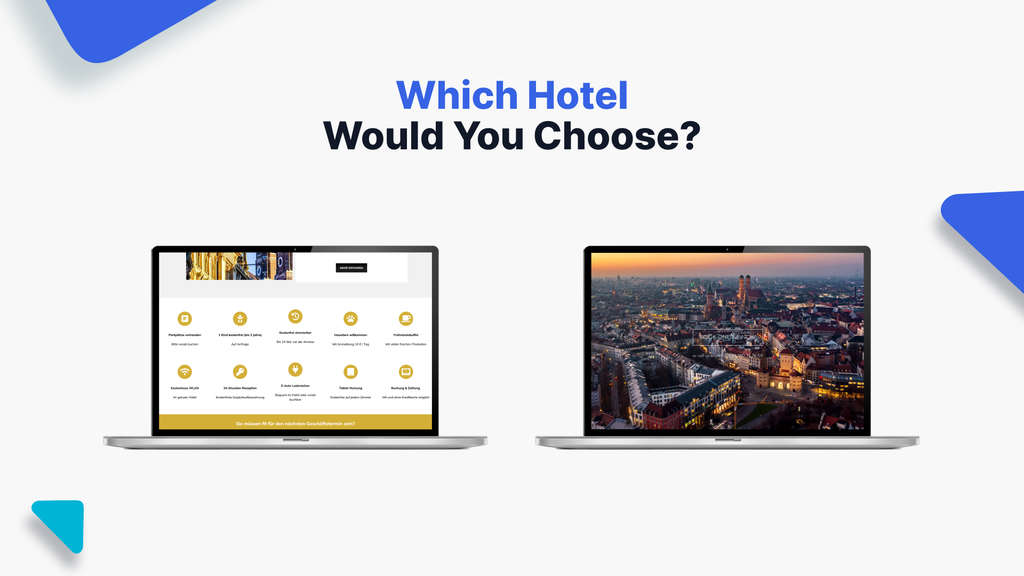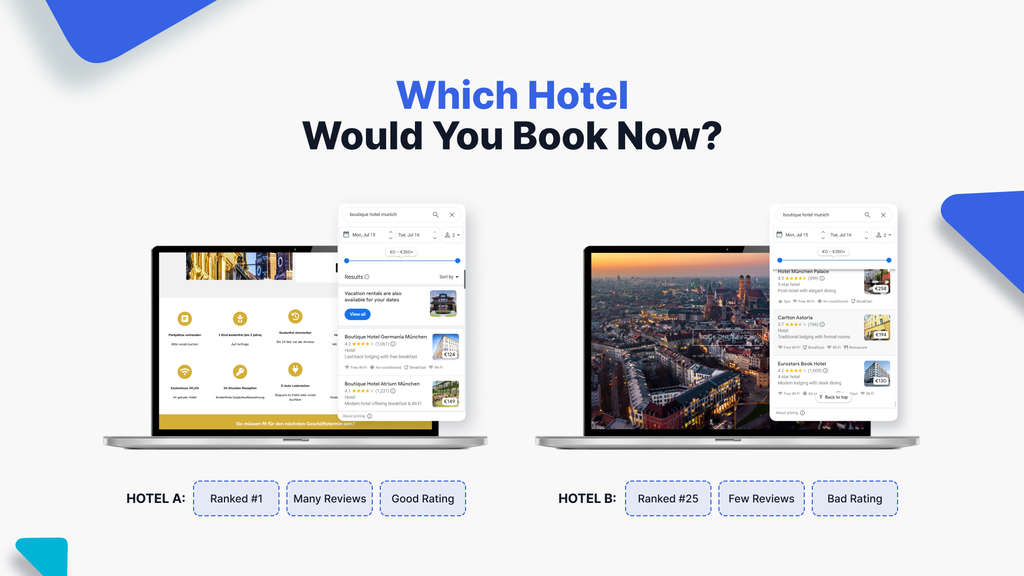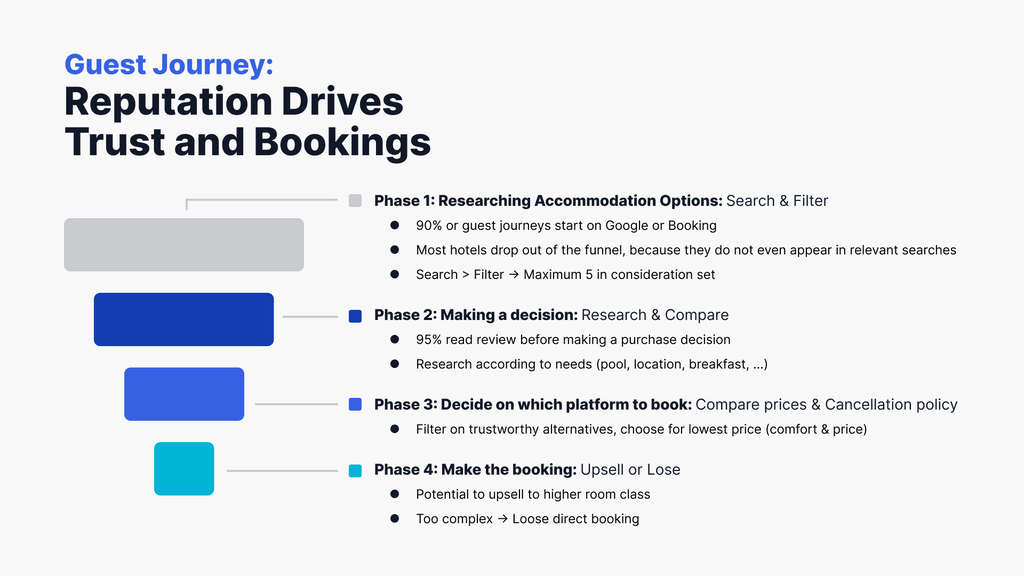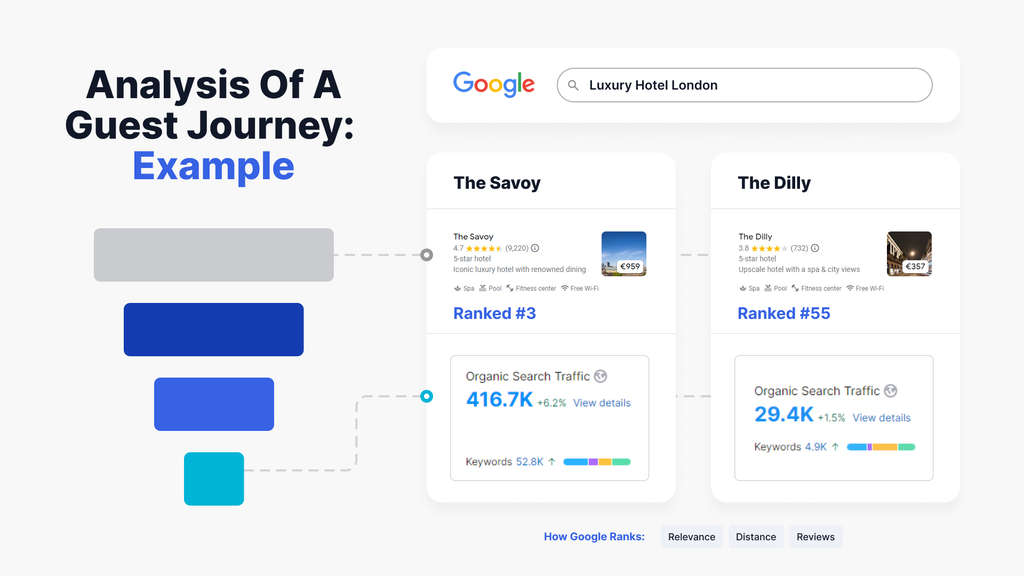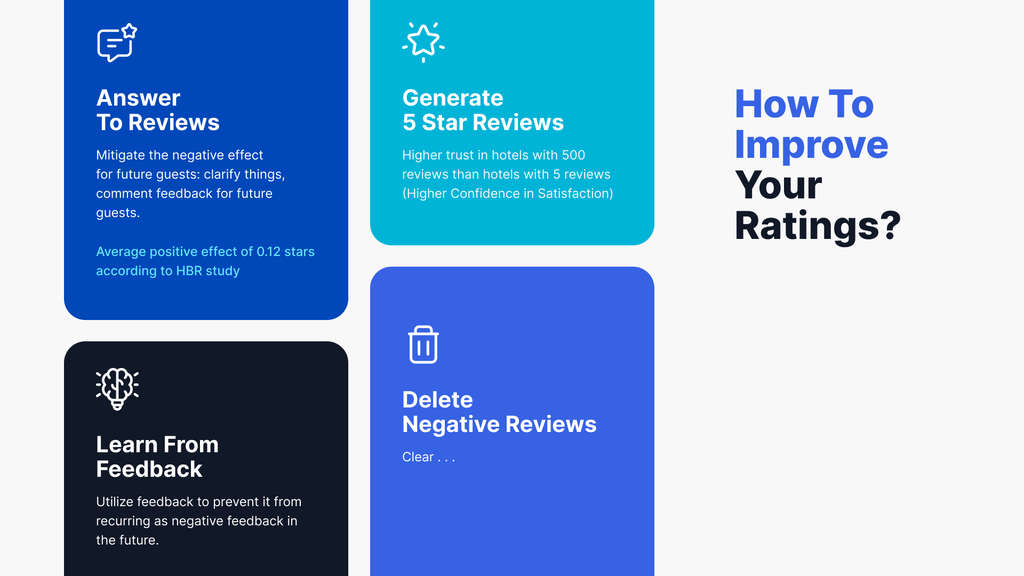Attracting More Guests: A Real Guide for Hoteliers to Increase Direct Bookings and Visibility
How to Optimize Your Online Reputation with AI Tools
Are you a hotelier struggling to attract enough guests without breaking the bank with high charges from OTAs? Perhaps you’ve found yourself wishing you had more direct bookings, but you’re unsure of how to get there. You're not alone. In this era of digitization and increased online competition, your predicament echoes the sentiments of many hotel managers. This article endeavors to enlighten you on how to attract more direct bookings, enhance your search visibility on platforms like Google, and manage your online reputation.
Most of the examples in this article are tailored to hotels, but the principles also apply to other local businesses. The article will answer key questions around enhancing direct bookings, boosting visibility on Google, improving overall ratings on booking platforms, managing guest reviews effectively, and evaluating the need for website optimization. Ultimately, it's all about optimizing your guests' journey and understanding the role of online reputation and trust.
Why optimizing your hotel's website may not yield significant impact
To visualize the concepts, picture two boutique hotels in Munich. Let's refer to them as Hotel A (left) and Hotel B (right).
Hotel A has a rather outdated website - think of a website from a decade ago. Visually it's rather unappealing, with lots of text and no clear call to action. On the other hand, Hotel B has a sleek, modern website with a clear call to action and a prominently displayed contact number.
Based on the website alone, you'd likely favour Hotel B. It's more evidently customer-oriented, it exudes modernity, and instills trust by offering easy contact options.
Now, consider the same hotels' Google profiles. Hotel A maintains a plethora of positive reviews, a fairly good overall rating, and it ranks as the number one boutique hotel in Munich. On the contrary, Hotel B has fewer, less favourable reviews, and ranks at number 25 for the same search query.
With this added information, most people might now prefer Hotel A. This example underscores the importance of considering the whole guest booking journey in maintaining your hotel's online reputation and why optimizing your hotel’s website is not the most impactful action for most hotliers.
Understand the Guest Booking Journey
To fully grasp how to improve your hotel's online reputation and increase direct bookings, it's crucial to understand the guest booking journey. It's a multi-phase process that most customers go through when selecting a hotel. While the process may differ slightly among individual consumers, there are four phases most journeys entail.
Phase 1: Researching Accommodation Options
The journey typically starts with the potential guest researching accommodation options. At this stage, they're not looking for a specific hotel – instead, they're exploring their options with search terms such as "luxury hotels," "boutique hotels," or "family-friendly hotels," often followed by a specific location. Their search will typically result in a large number of options which they'll filter based on their preferences like price, star rating, amenities, etc. This stage's main objective is to shortlist the large number of options down to a manageable set of preferred hotels.
Phase 2: Researching and Comparing
The decision-making process is usually the next phase. Here, guests research and compare the shortlisted options based on their needs. Reviews and ratings become crucial at this point. Potential guests often absorb pictures, read feedback from previous guests concerning various factors like location, food, service, room comfort etc. They might also take into account recommendations from friends or family. The outcome of this phase is a final decision on the preferred hotel.
Phase 3: Deciding the Booking Platform
Once the decision is made, guests then decide which platform to book through. This usually involves a comparison of prices across the various platforms. Most guests opt for the platform that offers the best price from a brand they trust.
Phase 4: Making the Booking
The final step is making the booking. At this point, the potential guest is fully convinced they want to stay at your hotel, and your primary job is to ensure they don't face obstacles while trying to book. This process should be seamless and straightforward, devoid of any hindrances that might discourage them from making the booking. This is also the stage where upsell opportunities exist like offering additional services such as airport pickups, breakfast packages, or higher room class options.
Understanding this journey is pivotal because it informs where your hotel can optimize to attract more guests. Here's why: if you're investing a lot in optimizing your website, but most of your potential guests drop out in Phase 1 because your hotel isn't visible on Google, then your efforts (and budget) might be better spent improving your visibility on search engines first. So before spending fortune on website optimization or invest on upscale, analyze the effectiveness of your guest booking journey and know where to best invest your resources.
What is Online Reputation and why it is important?
Your hotel's online reputation is vital for its success and profitability as it creates visibility, trust, and significantly influences your potential guest's decision-making process.
When deciding on a hotel, potential guests place a lot of weight on the experiences of others. The assurance provided by the positive experiences of others is often seen as a reliable prediction of the quality of their own prospective experience. Would you, for instance, book a hotel with no reviews or one with a mere 4.5-star rating based on only five reviews? Unlikely. Conversely, a hotel with a 4.5-star rating based on 500 reviews is perceived as trustworthy, thereby enjoying a strong online reputation.
Online Reputation = Your star rating on important platforms
Your online reputation is a digital representation of your hotel's quality – characterized by factors such as guest reviews, star ratings, and how you handle feedback. As reviews are the most important factor on which guests rate the quality of a hotel, we often simply online reputation as the a hotel’s star rating on important platforms.
So what does 'Online Reputation Management' mean? In essence, it's the process of controlling and improving how your hotel is perceived online. It involves tracking what's being said about your hotel online, responding to comments (both positive and negative), promoting positive content, and creating strategies to repair any damage from negative reviews or feedback.
Let's break it down further:
- Online - Your hotel's reputation is accessible to people online.
- Reputation - It's the perception that people online form about your hotel based on reviews, ratings, and feedback. A good reputation signals quality to guests and therefore allows you to charge a price premium compared to alternatives.
- Management - It's the action of controlling, influencing, or improving your hotel's online reputation.
In short, Online Reputation Management is an ongoing process of establishing, embellishing, and maintaining your hotel's positive image online. It serves as a pivotal tool in your strategy to boost direct bookings and command premium prices by fostering trust and confidence among guests.
A Case Study: The Dilly and The Savoy
To illustrate the importance of online reputation management, let's delve into an example featuring two luxury hotels in London - The Dilly and The Savoy.
The Dilly vs The Savoy: A Difference in Visibility
When you search for a 'luxury hotel in London', The Savoy ranks as number three. It has amassed a substantial number of reviews — over 9,000, to be exact— with an impressive average rating of 4.7.
Contrastingly, The Dilly – albeit also a five-star hotel – comes in at a much lower rank of 55 for the same search query. It only has 700 reviews and an overall rating of 3.8.
When quantifying this difference in online visibility, an SEO tool named Semrush (which gives an estimate of organic search traffic on a website) shows that The Savoy receives around 416,000 organic visitors on their website monthly. Meanwhile, The Dilly only draws approximately 29,000 monthly visitors from all organic sources - a substantial difference.
This disparity can be attributed to their respective online reputations. The Savoy, with its higher number of positive reviews and desirable rating, attracts a significantly higher number of online visitors, thus yielding a more prominent online presence.
Important Ranking Factors
Google, like other platforms, ranks businesses based on key factors. In the case of hotels, these are relevance, distance, and reviews, or what Google labels 'prominence'.
- Relevance: When a guest searches for 'luxury hotels in London', Google will prioritize hotels that match this description.
- Distance: A hotel in Scotland will not rank high for a search query such as 'luxury hotels in London'.
- Reviews (or Prominence): Google rewards businesses that people frequently discuss in the offline world by ranking them higher. A high number of reviews and a favourable average rating increase a hotel's prominence.
The number of reviews and the overall rating (the two most significant factors of 'prominence') are both aspects that hotel management can influence.
The Takeaway
Combining these factors and gauging their websites, we can conclude that The Savoy can focus on optimizing their website for converting prospective guests because they already secure high traffic on their website, thanks to their strong online reputation and high search visibility. On the other hand, The Dilly should prioritize improving its online reputation to increase search visibility, which will, in turn, drive more traffic to their website.
Transforming online reputation into a tool for attracting more direct bookings involves strategic online reputation management, and as our example indicates, it can make a significant difference in a hotel's success or failure.
Boosting Your Ratings: A Necessity, Not a Luxury
Considering the immense influence of your hotel's rating on its online visibility and the consequential bookings, cultivating impressive ratings should be a top priority. But improving ratings isn't a spontaneous phenomenon; it's the result of strategic and consistent efforts. Here are four practical strategies for enhancing your ratings:
Generating More Five-Star Reviews
The more positive reviews your hotel garners, the better. Encourage your guests to leave reviews about their experiences at your hotel. Keeping your guests engaged during their stay increases the likelihood of them leaving a positive review, which can bolster the overall rating.
Responding to Reviews
Engaging with guests who leave reviews has twofold benefits: it shows your hotel takes customer feedback seriously, and it can influence potential guests reading the reviews. Ensuring you respond to both positive and negative reviews can have a significant impact on the perception of your hotel online.
Responding to all reviews, regardless of whether they're positive or negative, undoubtedly requires time and resources, but its benefits are worth the effort. Here are three compelling reasons:
Dissuasion of Negative Reviews
Responding to all feedback can paradoxically result in fewer negative reviews. Seeing that every review gets a personal response can discourage unhappy guests from leaving a public critique. Psychologically, people tend to avoid conflict. Therefore, the public nature of online reviews can deter potential negatively biased reviews.
Encouragement of Positive Reviews
A robust response process can encourage more positive reviews. When guests see that their feedback is valued and elicits a response — especially a positive one — they are more likely to share their own positive experiences.
Sharing Your Perspective
Responding to reviews enables you to narrate your side of the story, which can influence potential guests' perception of your hotel. For instance, by addressing a complaint while presenting facts — like rules or policies — you can indirectly address potential guests' apprehensions.
Learning from Feedback
Every review — particularly the negative ones — is an opportunity for learning and improvement. Actively identify reoccurring problems highlighted by guests and address them. Streamlining processes through guests’ feedback enhances the hotel's operations and the guests' satisfaction, ultimately contributing positively to your rating.
Deleting Negative Reviews
On certain platforms, like Google, it's possible to delete negative reviews. While it's crucial to handle negative reviews positively — by apologizing if necessary and addressing the complaints — sometimes, the removal of such reviews can have a positive effect on your average rating.
Improving your hotel's ratings requires systematic efforts. By incorporating these strategies into your hotel's online reputation management, you can positively influence your ratings, effectively enhancing your hotel's visibility and attractiveness to potential guests.
Efficiency is King: How AI Can Elevate Your Online Reputation Management
In the modern, fast-paced world of hospitality, efficiency is king. Staff shortage is a widespread problem, and managers cannot afford to have their teams spending hours each day responding to online reviews or analyzing guest feedback. However, this doesn't mean the process should be overlooked - far from it. Online reputation management is still a crucial aspect of the hotel industry. This is where innovative solutions like AI (Artificial Intelligence) tools can play a significant role.
AI can streamline online reputation management by automating responses to reviews, providing insights from guest feedback, and continuously monitoring your online reputation. This can enable hoteliers to address the significant aspects of online reputation - generating more reviews, improving ratings, responding efficiently and personally to reviews, and learning from the feedback - all while saving precious time.
Leveraging AI Tools for Efficient ORM
Imagine a tool that did all the heavy lifting for you – took care of your responses, provided you with crucial insights from your reviews and saved you a considerable amount of time. This is where AI tools like MARA step in. MARA, an online reputation management software, uses cutting-edge AI to provide efficient yet personalized responses to reviews.
With those tools, you can create a draft or even reply to online reviews automatically. The ORM tool you choose should help you improving your average rating across platforms, thus enhancing your search visibility, which in turn boosts bookings without creating more work.
Customer testimonials indicate that hoteliers who've used MARA have seen their average rating rise by 0.22 stars within two years, a substantial increase that can translate into significantly higher visibility and bookings.
As the hospitality industry faces a growing push to be innovative and competitive amidst challenges, AI tools like MARA become more and more important to focus human time for personal interactions with the guest in-stay and focus on efficient operations. By enhancing online reputation management efforts with the help of AI, you can save time, generate more reviews, improve your ratings and ultimately, increase your bookings.
In conclusion, understanding the guest booking journey and the importance of online reputation, alongside leveraging efficient AI tools like MARA, can position your hotel to attract more guests and drive profitability. Efficiency and innovation, together with enhanced online reputation, can make a significant difference in increasing direct bookings and improving the bottom line in the hotel industry.
About MARA Solutions
Effortless AI Online Reputation Management.
MARA helps you optimize your reviews to boost visibility and direct bookings with:
- The most personal AI for review responses that adapts to your language
- Review Inbox with collected reviews from all your review sources. Replying becomes as easy as hitting "Generate reply" > "Send" > "Done".
- Truly personalized and actionable analytics, as individual as each hotel
- Response automation (e.g. automatic responses to 5-star reviews without text from Google)
